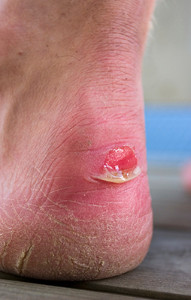
 A natural defense mechanism the body uses to protect damaged skin is referred to as blisters. They are defined as small areas that are filled with fluid that cushions the skin, and this may prevent an infection from occurring. The pain may be intense from blisters that develop on the feet, and this may be a result of the body weight the feet typically bears. Most blisters are caused by friction and pressure, and this may happen when improper shoes are worn. Additionally, there may be other reasons why blisters may occur, including being exposed to freezing temperatures, which may cause the painful condition known as frostbite, spending excess time in the sun, which may lead to severe sunburn, or having an allergic reaction to an insect bite. Some patients develop blisters as a result of specific chemicals in laundry detergents or skin cleansers. If you have blisters on your feet, it is suggested that you counsel with a podiatrist who can properly guide you to correct treatment options.
A natural defense mechanism the body uses to protect damaged skin is referred to as blisters. They are defined as small areas that are filled with fluid that cushions the skin, and this may prevent an infection from occurring. The pain may be intense from blisters that develop on the feet, and this may be a result of the body weight the feet typically bears. Most blisters are caused by friction and pressure, and this may happen when improper shoes are worn. Additionally, there may be other reasons why blisters may occur, including being exposed to freezing temperatures, which may cause the painful condition known as frostbite, spending excess time in the sun, which may lead to severe sunburn, or having an allergic reaction to an insect bite. Some patients develop blisters as a result of specific chemicals in laundry detergents or skin cleansers. If you have blisters on your feet, it is suggested that you counsel with a podiatrist who can properly guide you to correct treatment options.
Blisters are prone to making everyday activities extremely uncomfortable. If your feet are hurting, contact Dr. Harris L. Klear of Burlington County Podiatry Associates. Our doctor can provide the care you need to keep you pain-free and on your feet.
Foot Blisters
Foot blisters develop as a result of constantly wearing tight or ill-fitting footwear. This happens due to the constant rubbing from the shoe, which can often lead to pain.
What Are Foot Blisters?
A foot blister is a small fluid-filled pocket that forms on the upper-most layer of the skin. Blisters are filled with clear fluid and can lead to blood drainage or pus if the area becomes infected.
How Do Blisters Form?
Blisters on the feet are often the result of constant friction of skin and material, usually by shoe rubbing. Walking in sandals, boots, or shoes that don’t fit properly for long periods of time can result in a blister. Having consistent foot moisture and humidity can easily lead to blister formation.
Prevention & Treatment
It is important to properly care for the affected area in order to prevent infection and ease the pain. Do not lance the blister and use a Band-Aid to provide pain relief. Also, be sure to keep your feet dry and wear proper fitting shoes. If you see blood or pus in a blister, seek assistance from a podiatrist.
If you have any questions, please feel free to contact one of our offices located in Marlton and Delran, NJ. We offer the newest diagnostic and treatment technologies for all your foot care needs.
Read more about Blisters